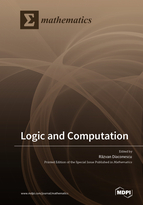Logic and Computation
A special issue of Mathematics (ISSN 2227-7390). This special issue belongs to the section "Mathematics and Computer Science".
Deadline for manuscript submissions: closed (31 March 2023) | Viewed by 9365
Special Issue Editor
Special Issue Information
Dear Colleagues,
Logic and computation are highly interdependent areas of research. On one hand, logic plays an important role in computation both at the foundational and at the applied levels. For instance, several well-known programming and specification languages and systems have been developed as computational implementations of logical systems. Computing paradigms such as declarative programming or formal specification and verification owe much to logic. On the other hand. there is a lot of computing-driven research in logic. Since the last century, many important developments in logic have happened in relation to computation. For instance, modern areas of logic such as higher order logic or the axiomatic approach to model theory (e.g., the institution theory of Goguen and Burstall) are very much driven by computing motivations.
This Special Issue dedicated to logic and computation invites submissions of papers that address any aspect of the rather complex and broad relationship between the two areas.
Prof. Dr. Răzvan Diaconescu
Guest Editor
Manuscript Submission Information
Manuscripts should be submitted online at www.mdpi.com by registering and logging in to this website. Once you are registered, click here to go to the submission form. Manuscripts can be submitted until the deadline. All submissions that pass pre-check are peer-reviewed. Accepted papers will be published continuously in the journal (as soon as accepted) and will be listed together on the special issue website. Research articles, review articles as well as short communications are invited. For planned papers, a title and short abstract (about 100 words) can be sent to the Editorial Office for announcement on this website.
Submitted manuscripts should not have been published previously, nor be under consideration for publication elsewhere (except conference proceedings papers). All manuscripts are thoroughly refereed through a single-blind peer-review process. A guide for authors and other relevant information for submission of manuscripts is available on the Instructions for Authors page. Mathematics is an international peer-reviewed open access semimonthly journal published by MDPI.
Please visit the Instructions for Authors page before submitting a manuscript. The Article Processing Charge (APC) for publication in this open access journal is 2600 CHF (Swiss Francs). Submitted papers should be well formatted and use good English. Authors may use MDPI's English editing service prior to publication or during author revisions.
Keywords
- higher order logic
- fuzzy logic
- type theory
- institution theory
- formal specification
- formal verification
- logic programming
- functional programming
- theorem proving






